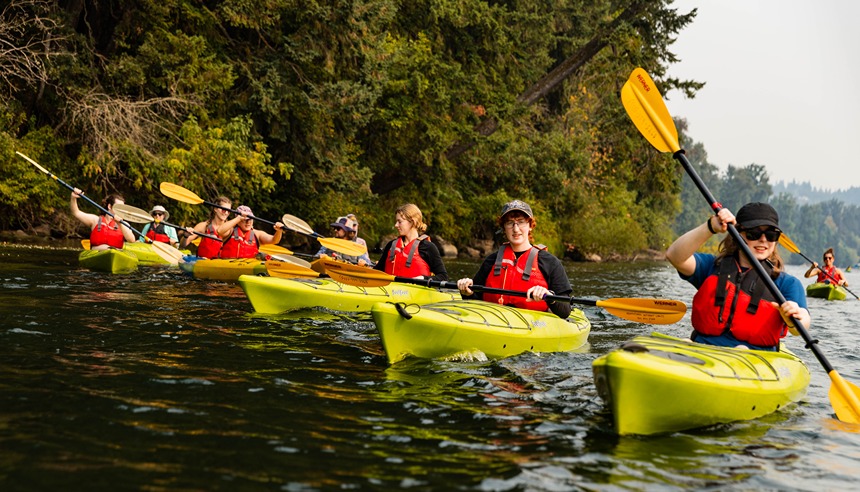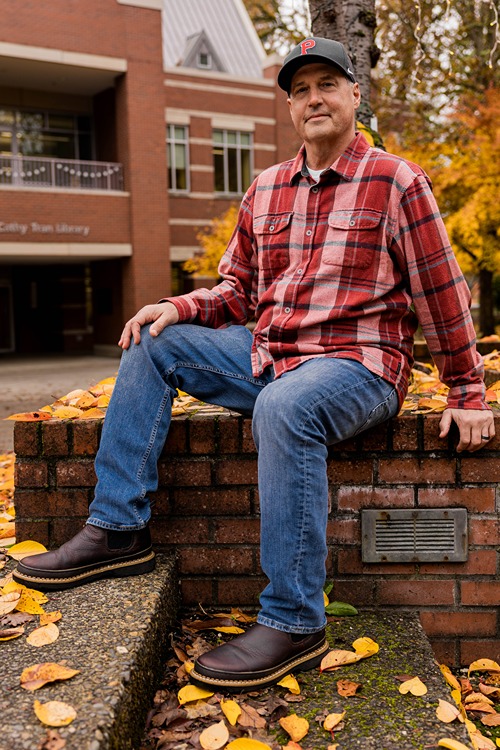 For people with physical and mental disabilities, developing connection with the outdoors can be difficult.
For people with physical and mental disabilities, developing connection with the outdoors can be difficult.
That connection is something that Brad Bafaro ’80, MAT ’86 has been working toward for decades.
A longtime advocate for special education in the Forest Grove community, Bafaro founded Adventures Without Limits (AWL) in 1995. The program is an off-shoot of the Community Based Activity Program (CBAP), a summer program for youth and adults with and without disabilities that he founded in 1990 that included an outdoor component.
Bafaro believed that making AWL’s offerings available to everyone would help break down the walls between students experiencing disabilities and mainstream students.
Based out of offices on the campus of Tom McCall Upper Elementary School in Forest Grove, the goal of developing AWL was to provide local outdoor experiences in an inclusive setting year-round. Before AWL, students and young adults in the Forest Grove community traveled to Portland for any kind of outdoor experience.
“I thought that it was important that we didn’t just provide programming for people with special needs, so we included all kids,” Bafaro said. “We started with 15 kids in a beat-up old van.” In 2022-23, AWL served 1,850 participants of all ability levels.
Today, the program provides outdoor programming to a diverse range of groups, including Pacific’s Outdoor Pursuits program. Funded by grants and user fees, AWL strives to make all trips available to those who do not have financial means. All equipment for trips is provided and additional gear, like coats, gloves and dry bags, is available for loan.
The heart of the program, however, continues to be providing outdoor experiences for those who face physical limitations and helping everyone understand that the outdoors is, and should be, for everyone.
 “You really don’t understand what people are going through until you are in their seat,” Bafaro said. “So if you want to understand how hard it is to kayak when you’re in a wheelchair without any trunk support, then you need to try it because it’s a battle. And if they can do it and feel good about themselves, it’s a lifelong activity.”
“You really don’t understand what people are going through until you are in their seat,” Bafaro said. “So if you want to understand how hard it is to kayak when you’re in a wheelchair without any trunk support, then you need to try it because it’s a battle. And if they can do it and feel good about themselves, it’s a lifelong activity.”
Bafaro’s passion for accessibility runs in the family. His father, Chuck, was a longtime Pacific University baseball coach and taught adaptive physical education classes as an instructor in the university’s physical education department. Chuck was also a longtime champion for youth involvement in sports, coordinating such programs as Forest Grove’s Little Guy Football and Little Guy Basketball programs.
When it comes to providing opportunities to physically and mentally challenged students, Brad Bafaro said that sports and the outdoors were perfect experiences. Working with students in those settings, he said, is a natural fit.
“P.E. was always a place where I felt like we could make sure kids were successful and that just spun into working in the outdoors,” Bafaro said. “A lot of that came from my experience at Pacific and also revolved around the work my dad was doing. It is also no different than coaching, no different than being a good teacher. It’s good instruction. It’s good teaching.”
The work that Adventures Without Limits does provides not only a great experience for participants but also for the staff that make those trips happen. In addition to the organization’s full-time staff, AWL hires seasonal workers and interns from across the country, including students from Pacific University. Many of those interns and seasonal workers have gone on to run outdoor programs of their own or build new programs in their own communities.
When Bafaro founded the program, he envisioned the program eventually fading away as more opportunities became available for physically and mentally disabled children to get outdoors. But the need for AWL hasn’t faded away. It has only grown in the last 30 years.
“When I first started, I hoped that all people would have access to the outdoors without any specialized support,” he said. “I think that there will always be a niche for helping people who wouldn’t normally be able to access the outdoors.”